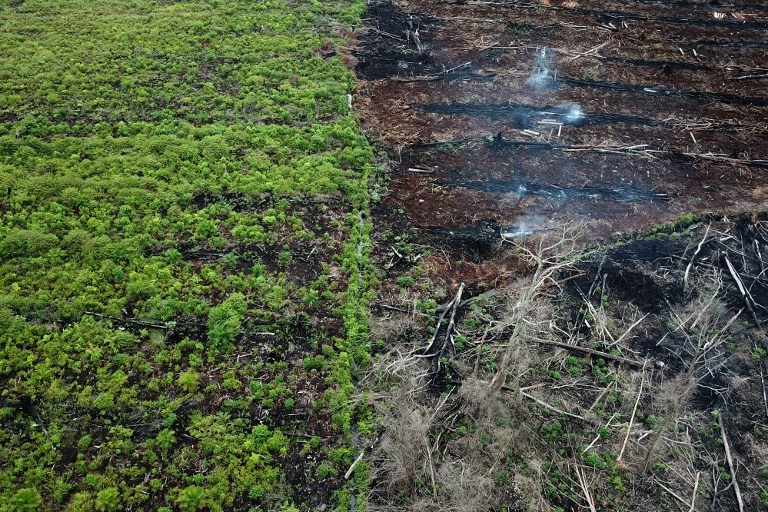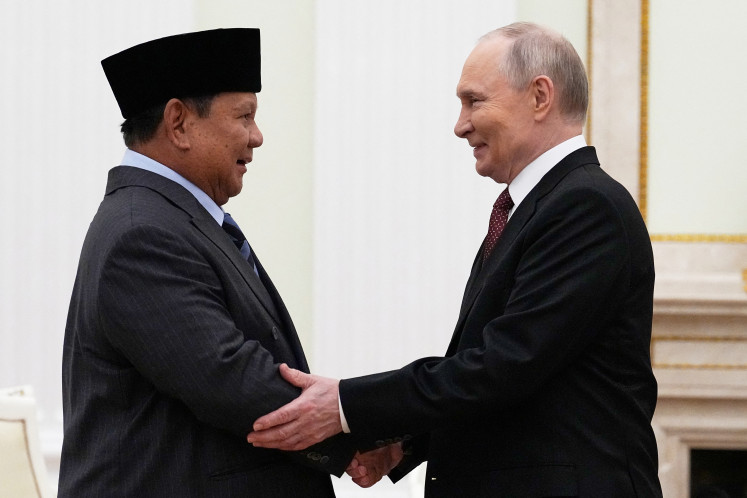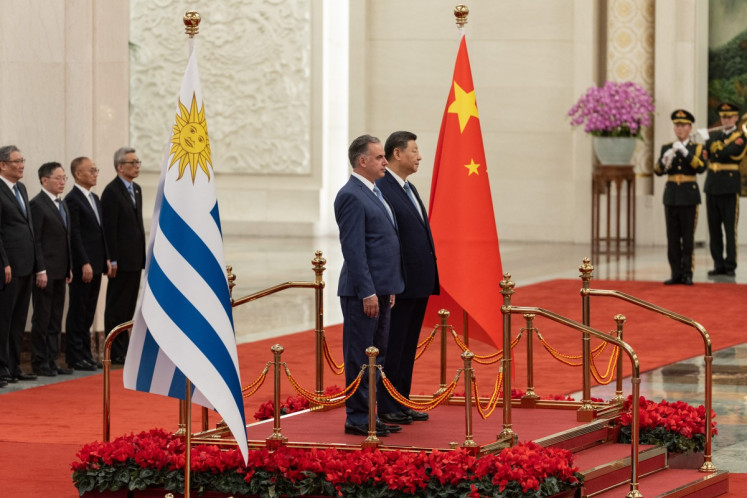Popular Reads
Top Results
Can't find what you're looking for?
View all search resultsPopular Reads
Top Results
Can't find what you're looking for?
View all search resultsPalm oil free labels a hindrance to sustainable development
Get ready, because the war against palm oil will not end as long as palm oil continues to be more competitive, better-quality and above all more sustainable than other vegetable oils.
Change text size
Gift Premium Articles
to Anyone
 This aerial photo taken on March 3, 2018 shows a protected area of the Rawa Singkil wildlife reserve as part of the Leuser Ecosystem in Trumon, South Aceh, which is being burnt in preparation for the opening of a new palm oil plantation Palm oil, a major ingredient in products from food to cosmetics, has long been controversial as environmentalists say it drives deforestation, with huge swathes of rainforest logged in recent decades to make way for plantations. (AFP/Januar)
This aerial photo taken on March 3, 2018 shows a protected area of the Rawa Singkil wildlife reserve as part of the Leuser Ecosystem in Trumon, South Aceh, which is being burnt in preparation for the opening of a new palm oil plantation Palm oil, a major ingredient in products from food to cosmetics, has long been controversial as environmentalists say it drives deforestation, with huge swathes of rainforest logged in recent decades to make way for plantations. (AFP/Januar)
G
et ready, because the war against palm oil will not end as long as palm oil continues to be more competitive, better-quality and above all more sustainable than other vegetable oils, especially European vegetable oils. This is demonstrated by the fact every time a step forward is made towards sustainability, accusers come up with new arguments, without acknowledging the incredible efforts made in just a few short years, in extremely difficult geographical and socio-economic conditions.
Have you ever heard anyone in Europe acknowledge the rapid improvement in the economic conditions and well-being of millions of African, South American or Asian citizens? Or has anyone ever celebrated access to education on the part of thousands of children who would otherwise be dying of hunger, without any prospects for the future? Access to education is more important than anything else for the future sustainability of our planet. In Europe, we’re more concerned about the conditions of the orangutans, or the world’s last green lung (now that we have destroyed the others).
It’s right to fight for sustainability, for the orangutans and for the forests. As Pope Francis maintains in his Encyclical, sustainable development requires striking a delicate balance between humanity and nature. Boycotting palm oil does nothing to strengthen this balance, and indeed complicates the achievement of the United Nations’ Sustainable Development Goals (SDG).
Those who discriminate against palm oil, also through the indiscriminate use of the “palm oil free” labels, are responsible for this failure.
Palm oil has one of the most sustainable production and supply chains, which complies with very stringent sustainability and food security standards; is subject to a large number of certifications in competition with each other precisely with regard to the achievement of the SDGs; is an extraordinary resource for economic growth and the improvement of living conditions: access to education and the spread of knowledge and innovation, which are the key factors for encouraging more sustainable production processes.
From an environmental and economic point of view, it is much better than its competitor oils and fats: significantly higher productivity per hectare; uses a lower amount of natural resources (earth, water) and energy; uses a lower amount of fertilizers and plant protection treatments; lower production costs, especially considering the high yield.
But it is precisely the characteristics above that give us the answer to our question. Why is it boycotted in Europe? Because it’s more competitive than sunflower oil, rapeseed oil and any other alternative energy resource.
It’s not pleasant to have to expose the inconsistent — and sometimes damaging — behavior of the NGOs. Their contribution to improving the sustainability of palm oil crops has, in the past, undoubtedly been useful for stimulating the production and supply chain and making it more responsible. Let’s ask them why they are not doing the same for other crops, or why they prefer to fight ideological battles, exploiting the poor orangutans, instead of striving to improve living conditions for the millions of people who make their living from palm oil crops and the oil production process.
More worrying still than the NGOs are the companies in the food sector replacing this ingredient with less sustainable alternatives. They have presented this turnaround as a positive change, but in fact all it is a marketing ploy to exploit the emotional reaction of consumers, fomenting it with false media campaigns, devoid of any scientific foundation. Italian and Spanish companies are acting as trailblazers in Europe for this, with misleading slogans that delude the consumer, and behind which there is no improvement to the products. The British are following with the recent anti palm oil commercial that has gained the front page of many elite main stream media.
The international community, Europe and the governments of the member states ought to forbid the claim “palm oil free”, because it is misleading.
The UN should also intervene, so that the SDGs can be achieved as quickly as possible. To do so, it is important to keep investing in the sustainable palm oil chain and strengthen partnerships between all the players involved. A move away from this direction means denying the urgent need to invest in sustainability. Saying no to palm oil means saying no to SDGs.
International institutions should provide incentives for the development of responsible production and supply chains, and adopt strict criteria also for other vegetable oils. The use of these products slows down the achievement of the SDGs, which will not be obtained unless the alternatives to palm oil also make a commitment to guaranteeing maximum sustainability.
If this does not happen, it would be confirmation of the suspicion that the question of sustainability is merely an excuse for a commercial blow to the palm oil chain, which is much more competitive. The countries that produce palm oil, such as Indonesia, Malaysia and Colombia, are now coming round to the idea that even if they were to achieve maximum levels of sustainability, the European Union and the NGOs would continue with their groundless accusations and threats of a boycott.
It’s time Europe adopted a responsible attitude and went down the road of true sustainability, as the countries that produce palm oil are doing. Right now we can only learn from them.
***
The writer teaches at John Cabot University and Temple University of Philadelphia and is founder of Competere.eu think tank group.










